News from Japan, Egypt and India
Tuesday's World Events — Posted on September 2, 2014
JAPAN – Japan approves larger military role
BEIJING – In a major security shift, Japan’s Cabinet approved a change [in July] that allows the country’s long-restricted military to come to the aid of an ally under attack, even when Japan or its forces are not directly threatened.
The move, expected for several weeks, drew swift opposition from China, which is engaged in a maritime dispute with Tokyo and said Prime Minister Shinzo Abe is building up Japan’s military capabilities counter to its pacifist constitution, drawn up after World War II.
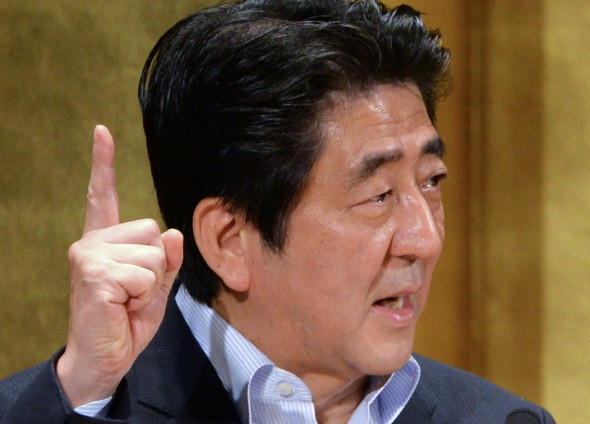
Japanese Prime Minister Shinzo Abe.
Abe’s Cabinet approved a reinterpretation of the constitution’s Article 9, which permits military force only to resolve conflicts in cases of self-defense. The new policy will allow “collective self-defense.” That would allow Japan’s Self-Defense Forces to defend allies under attack.
Abe said at a news conference [on July 1] that Japan remains a peace-loving, defense-oriented nation, that will not launch a war against other countries and will not join wars waged by other countries. But in view of the changing security environment, Japan must revise its defense posture to protect Japanese lives, he said.
“Japan will not resort to the use of force if the objective of the action is nothing more than the defense of a foreign country,” Abe said. “If we are fully prepared, an attempt to wage war against Japan will be thwarted. This is called deterrence.” [deterrence as used here is the maintenance of military power for the purpose of discouraging attack]
Abe offered an example of how Japan’s revised rules of engagement could work. If U.S. vessels rescuing Japanese nationals from a conflict zone were attacked, Japan’s military could provide protection to those vessels, he said.
Japanese military personnel do not engage in combat overseas, although small numbers have participated in United Nations peacekeeping operations.
The change is welcome news to the United States, which maintains troops in Japan.
Abe’s reassurances carried little weight in China, which suffered greatly from a Japanese invasion and occupation in the 1930s and 1940s. The two nations have strained relations over a territorial dispute over a group of uninhabited islands in the East China Sea.
“We oppose Japan’s fabrication of the so-called China threat so as to serve its domestic political purposes,” Chinese Foreign Ministry spokesman Hong Lei said Tuesday. “People cannot but question whether Japan will change the peaceful development path it has long stuck to since the end of World War II,” he said, according to Xinhua, the state news agency.
In South Korea, which was colonized by Japan from 1910 to 1945, Foreign Ministry spokesman Noh Kwang Il said, “The South Korean government views it as a significant revision to the defense and security policy under the postwar peace constitution and is paying a sharp attention to it.”
EGYPT – Egypt’s president announces plans for new Suez Canal
In a highly symbolic gesture to the new regime’s ambitions, Egypt’s President Abdulfattah el-Sisi [on August 5] announced that the country would build a second Suez Canal.
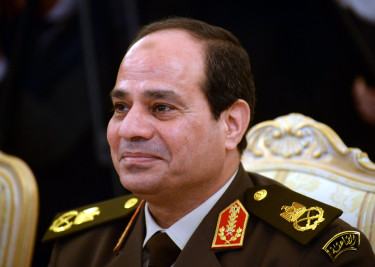
Egypt’s President Abdulfattah el-Sisi
Mr. Sisi, the former army chief who deposed the Muslim Brotherhood’s* elected President Mohammed Morsi and took his place in June, appeared in person at a televised ceremony to launch the plan. As he spoke, fighter planes flew overhead to mark the event. [*The Muslim Brotherhood is considered a terrorist organization by the U.S., EU and others.]
The authorities had already indicated they would press ahead with building an ambitious economic development zone on the canal, a long-mooted and much-delayed project.
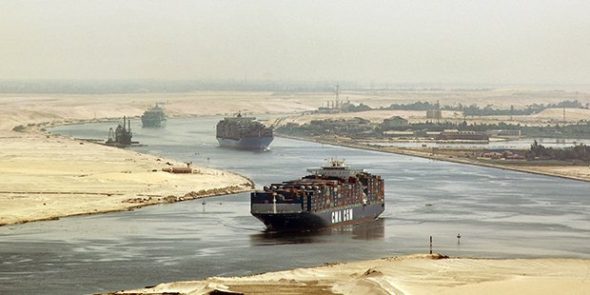
A ship crossing the Suez Canal (from the Cairo Post)
But the new regime is determined to present itself as building a “new Egypt” beyond even the ambitions of former military-led “revolutionary” governments.
“We will lift our country on our shoulders,” Mr. Sisi said. “We will not leave it or lose it.” The new segment of the canal will be 45 miles long, branching off from the current canal, which is 120 miles. The Suez Canal Authority says the extension is needed to reduce waiting times for vessels from an average of 11 hours to three.
It also hopes to increase revenues from $5 billion to $13.5 billion by 2023, a substantial increase that would quickly recover the costs of the project, which are estimated at $4 billion.
At present, 18,000 vessels use the canal every year, passing between the Mediterranean and the oil and manufacturing centers of Asia without the need to travel round the Cape of Good Hope.
The original canal was built by French engineers and opened by Egypt’s then ruler, the Khedive Ismael, in 1869 – a time when he was frantically leading a modernization of the country along western lines. [It took 10 years to build.]
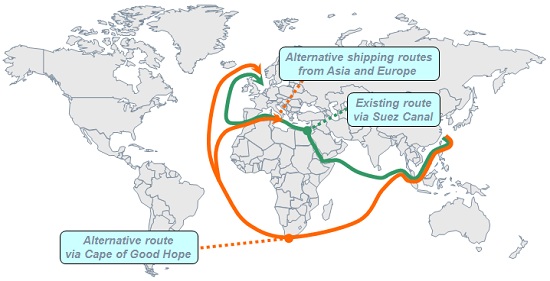
The Canal was nationalized by Egypt’s first military dictator, Col. Gamal Abdul Nasser, on July 26 1956, sparking a joint attack by France, Britain and Israel remembered now as the disastrous Suez Crisis.
Mr. Sisi has pledged to “restart” Egypt, urging its population to get up earlier and work harder to rejuvenate the country.
However, he has also refused to consider reducing the army’s control over key parts of Egypt’s infrastructure* and even economy, and he placed the army in charge of “supervising” the canal’s construction for security reasons. Construction contracts will be offered to local firms, he said. [*the basic equipment and structures (such as roads and bridges) that are needed for a country, region, or organization to function properly]

An army company is also said to be part of the consortium likely to be awarded the contract to oversee building the new development zone, according to one report.
In keeping with his grand vision, Mr. Sisi asked the canal developers to complete digging in one year, rather than the three years scheduled. “You are mandated, in front of me and the Egyptians, to end this project next year,” he said, addressing the head of the army engineering corps, Gen. Emad el-Alfi. “How? I don’t know.” …
INDIA – New Delhi’s residents and officials living in fear of marauding monkeys considered holy by Hindus
Senior ministers from India’s newly elected government have been unable to move into their official New Delhi residences and offices because they are infested with marauding monkeys.
Increasingly unafraid of humans, hundreds of these red-faced rhesus macaques have, over decades, commandeered roads, public buildings, bungalows and parks at the heart of India’s capital. The monkeys pose a particular health risk as they can be violent toward humans and frequently carry rabies.
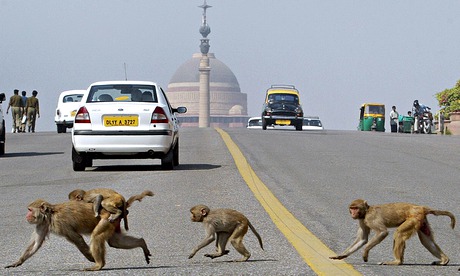
Monkeys cross the road in front of India’s Presidential Palace and government buildings in New Delhi. Photograph: Raveendran/AFP/Getty Images
Anyone trying to trap the monkeys may be beaten up or chased away by the Hindu public, whose religious sentiment associates them with Hanuman, the monkey-god who helped Lord Rama defeat Ravana, the evil king. Shooting them would be unthinkable in a country dotted with tens of thousands of Hanuman temples, and where every Tuesday is reserved for the monkey-god’s worship.
Instead, to counter this menace in the Lutyen’s neighbourhood – named after the British architect who designed India’s capital a century ago – municipal officials have resorted to deploying around 40 ‘ape men’….
Mimicking long-tailed Langur monkeys, which the pillaging macaques fear, the ape men leap around making loud throaty sounds and intimidating gestures to scare the simians away. But within hours the monkeys return, often in greater numbers, to re-establish control.
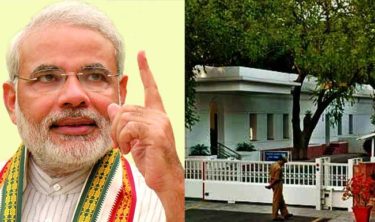
7 Race Course Road or 7 RCR is the residence of the Prime Minister of India, Narendra Modi.
Three ape men daily scour Prime Minister Narendra Modi’s five-bungalow residence complex in the Lutyen’s zone, officials said. Two others are assigned to Congress Party chief Sonia Gandhi’s nearby home.
And [in the beginning of August], following repeated complaints from residents about the number of roaming macaques, one ape man has been permanently stationed at home minister Raj Nath Singh’s house. “We mimic langur’s, use sticks and sling shots to scare the monkeys away, but it’s a full time and arduous task” said Narayan Nath who supervises the operation.
Monkeys also dominate the contiguous Presidential Palace and North and South Blocks of the Secretariat Building, housing the PM’s office and the defense and home ministries.
Powerful officials walking down cavernous passageways in these buildings risk being set upon by monkeys concealed in the dark niches and cornices of the colonial sandstone buildings.
Tough wire meshing stretches across the windows of the Indian Army chief’s office to safeguard the head of the world’s third largest – and nuclear-armed – military from monkeys. …
(The news briefs above are from USA Today on July 1 and London’s Daily Telegraph on Aug. 5 and Aug. 8.)
Background
JAPAN
- Japan's postwar constitution, adopted under Allied supervision, included a "Peace Clause" (Article 9), which renounced war and banned Japan from maintaining any armed forces.
- This was intended to prevent the country from ever becoming an aggressive military power again.
- However, within a decade, America was pressuring Japan to rebuild its army as a bulwark against communism in Asia after the Chinese Civil War and the Korean War, and Japan established Self-Defense Forces.
- Traditionally, Japan's military spending has been restricted to about 1% of its gross national product, though this is by popular practice, not law, and has fluctuated up and down from this figure.
- Prime Ministers Junichiro Koizumi and Shinzo Abe, and other politicians have tried to repeal or amend the clause. Although the intention of the American occupation was to demilitarize the Japanese [after WWII], due to the subsequent perceived threat of communism in Asia, and at American urging, the Japanese military was slowly restored to considerable strength. Japan now has the sixth largest military budget in the world (from wikipedia)
The Associated Press reported on July 1:
- The move will allow the Japanese military to defend other nations under what is known as "collective self-defense."
- Previous governments have said that Japan's war-renouncing constitution limits the use of force to the defense of Japan.
- The constitution was drafted by American occupation forces after World War II in part to prevent a repeat of Japan's invasion and brutal occupation of wide swaths of Asia.
- Prime Minister Shinzo Abe is pushing hard for the change. He cites a deteriorating security environment, including China's rise and North Korean missile and nuclear threats.
EGYPT
- The Suez Canal is an artificial sea-level waterway running north to south across the Isthmus of Suez in Egypt to connect the Mediterranean Sea and the Red Sea.
- The canal separates the African continent from Asia, and it provides the shortest maritime route between Europe and the lands lying around the Indian and western Pacific oceans.
- It is one of the world's most heavily used shipping lanes.
- The canal is extensively used by modern ships, as it is the fastest crossing from the Atlantic Ocean to the Indian Ocean. Tolls paid by the vessels represent an important source of income for the Egyptian government. (from the Egyptian government's Suez Canal website: suezcanal.gov.eg)
The Wall Street Journal reported:
- But while shipping industry executives have welcomed the idea of expanding the Suez Canal to help relieve bottlenecks, there are doubts over whether Egypt can finish the project on schedule, and over how it will obtain the funding.
- Egypt has for years planned to develop 47,000 square miles around the 101-mile Suez Canal into an international industrial and logistics hub.
- But the plan for the new parallel canal is also being seen as an attempt by Mr. Al Sisi to shore up support for his government amid continuing economic problems in Egypt.
- "[There are] questions about the merits of the overall project. The country is still in a very difficult situation, with population growth high, economic growth low, and where inflation remains high, in addition to a more politicized population," said Angus Blair, chief executive of Signet, a Cairo-based regional forecasting consultancy firm.
- Others have suggested Suez Canal may not need an upgrade.
- "I don't understand the logic of this Suez Canal expansion," said Robin Mills, head of consulting at Manaar Energy in Dubai. "On the oil side, the canal's importance is likely to wane as European Union oil imports from the Middle East fall. As for liquefied natural gas, the existing canal can already take the largest LNG carrier." (from wsj.com)
and from the Telegraph article above:
- The cost of the project takes account of the need to build tunnels under it to link the Sinai to the rest of Egypt. Part of the thinking of both [plans] is not only to improve the country's industrial infrastructure but to bring more development to the Sinai, which is plagued by terrorism.
- A year ago, a militant group managed to get close enough to the canal, despite heavy security, to hole a passing Chinese container vessel with two missiles from a rocket-propelled grenade launcher, though no-one was hurt and no serious damage done.
- "We all know the sensitive situation of Sinai, and this is something that should be of concern to all of us as Egyptians," Mr. Sisi said. (from the Telegraph article above)
INDIA
- For decades, New Delhi's streets were patrolled by wallahs with their trained langurs. But the practice ended last year after a court ruled keeping them in captivity was cruel.
- "Monkey man" Mahendra Goswami and his colleagues, who are in high demand particularly in Delhi's plush VIP quarters, can also use slingshots and sticks to ward off the animals.
- Recently locals erected a plastic langur with a tape machine inside that played recorded sounds of the animals in a bid to scare them away.
- "It took a group of monkeys three days to realize it was a dummy and then they raided it like a wolf pack and took away all its pieces," Goswami said. (from Agence France-Presse)
from the Telegraph article above:
- Elsewhere in Delhi monkeys are once again infesting India's flagship hospital, after having learnt to operate the newly installed automatic doors.
- Doctors at the All India Institute of Medical Sciences said the horde of monkeys, who had colonised the premises since the 1960s, had recently worked out how to open the motion-censor operated doors installed across the hospital campus.
- These included the neurosurgery department and nearby patient recovery rooms, where the monkeys have been spotted snatching food, terrorising medical staff and playing with sensitive equipment.
- Operating alone or in pairs, they have also created bedlam outside one of the operation theatres, and when chased away by the hospital security staff hid in the false ceiling only to re-emerge when the coast was clear.
- Past efforts to rid the hospital of the macaques, descendents of those who escaped from the Institute's research laboratories several decades ago, remain handicapped by Hindu religious sentiment.
- Relatives and friends accompanying patients to hospital regularly feed the monkeys hoping "god" will hasten their recovery.
